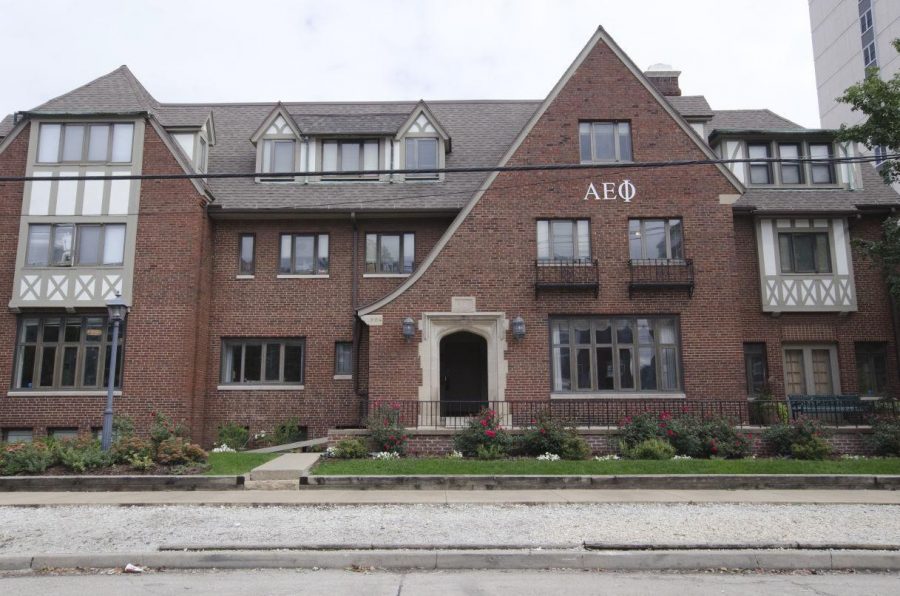Campus Greek life plays important role in diversity, inclusivity
The Alpha Epsilon Phi Sorority is a Jewish-affiliated establishment. Some Greek houses on campus are working to become more diverse and inclusive.
Apr 12, 2017
Greek life has been a part of the University since 1872. It is one of the many notable characteristics of the University, with nearly 8,000 undergraduate students involved in Greek life, with 91 fraternities and sororities on campus, the university has the most Greek organizations on any U.S. college.
The university is also home to 35 Greek organizations with cultural or religious affiliations. The University boasts organizations with Asian, Black or African-American, Latino or Latina, Multicultural and South Asian cultural affiliations as well as organizations with Catholic, Jewish and Lutheran religious affiliations.
Alejandro Suñé, assistant director of Fraternity and Sorority Affairs, said the University has a rich history of cultural Greek life on campus.
“We have three black Greek letter organizations that have been here for 100 or more years … for Asian, Latino, Latina, multicultural and South Asian, the oldest one we have here is almost 30 years old,” Suñé said.
Suñé said membership in these cultural organizations has grown in recent years, showing their importance on college campuses.
Get The Daily Illini in your inbox!
“I think it offers variety. I think it helps offer options. I will tell you, one of the things we’ve seen recently is an increase in the membership of cultural fraternities and sororities,” Suñé said. “Right now that’s demonstrating that cultural fraternities and sororities are important.”
Suñé said the diversity of Greek life can help improve overall campus diversity and the presence of cultural and religious houses make students feel more comfortable.
“As an institution looks to increase certain populations they have of students attending, having options definitely helps,” Suñé said. “Even though sorority and fraternities aren’t used to recruit, they are very much a retention tool for students to stay at the University and graduate successfully.”
The main difference between the cultural and religious Greek organizations and Greek organizations without an affiliation is their emphasis on cultural and religious awareness and acceptance. Despite their specific affiliations, a person of any cultural or religious identity is able to join any organizations.
Moises Contreras is a senior in LAS and committee chair for community service for Sigma Lambda Beta, a fraternity with a Latino affiliation.
Contreras said the founders of his fraternity had a vision to create an organization that promoted acceptance of all cultures during a time when Latinos were not equally accepted on campus.
“There were feelings of not being supported on campus as a minoritized group,” Contreras said. With that being said, our founders had a vision to have this organization with the feature of being a brotherhood to have this support system for the Latinos on campus.”
William Cheng, sophomore in LAS and chapter president of Omega Delta, a fraternity with a multicultural affiliation, believes that in general, there is a diverse population of students that participate in Greek life, but there is usually not much diversity within specific organizations.
“I would say that overall, it’s pretty diverse, but from an individual fraternity or sorority standpoint, not so much,” Cheng said.
Cheng believes some minority members may feel dissuaded from joining some Greek life organizations without a cultural or religious affiliation because they do not feel they are similar to other members.
“I don’t think that it’s really because the organizations themselves don’t accept members who are different from them, it’s just the fact that people like to be around people who are similar to themselves,” Cheng said.
Dorothy Christoforou is a sophomore in LAS and panhellenic delegate of Alpha Epsilon Phi, a sorority with a Jewish affiliation.
Christoforou believes, although the University is considered to be one of the most diverse in the nation, there is still room for improvement. She believes students in Greek life can improve on the acceptance and promotion of each other’s differences.
“I think going through recruitment or recruitment in general and being in Greek life might deter minorities from joining, just because we really don’t focus on exploiting our differences in a good light and showing how diversity could be,” Christoforou said. “I don’t think we’ve reached that level yet, but I hope we will.”
Nevertheless, Christoforou said the variety of affiliated organizations on campus does show that the University is a diverse campus, and students can gain from being around others who are different from them.
“Having a diverse campus has offered us (students) so many benefits and so many opportunities to grow and to learn … it makes us unique,” Christoforou said.
Suñé said ultimately, choosing a fraternity or sorority is about being comfortable with the other members, no matter their differences in culture or religion.
“It’s not just the culture, it’s not the affiliation, it really is about finding a good fit and this whole concept of people joining people, which is why we see non-Latinos joining Latino organizations,” Suñé said.






